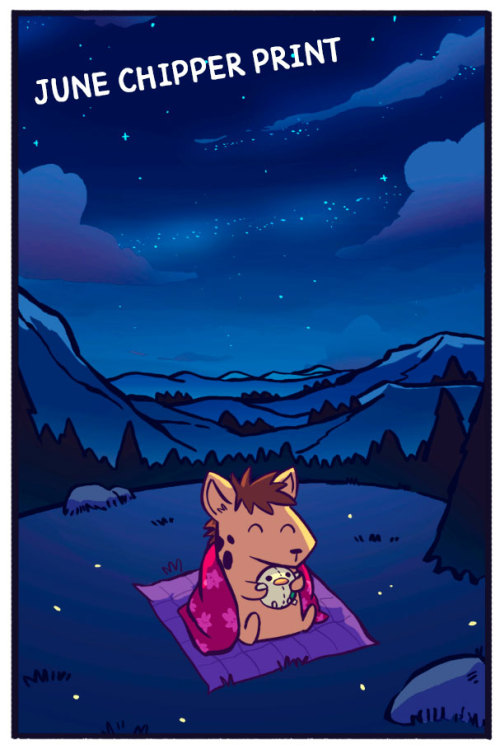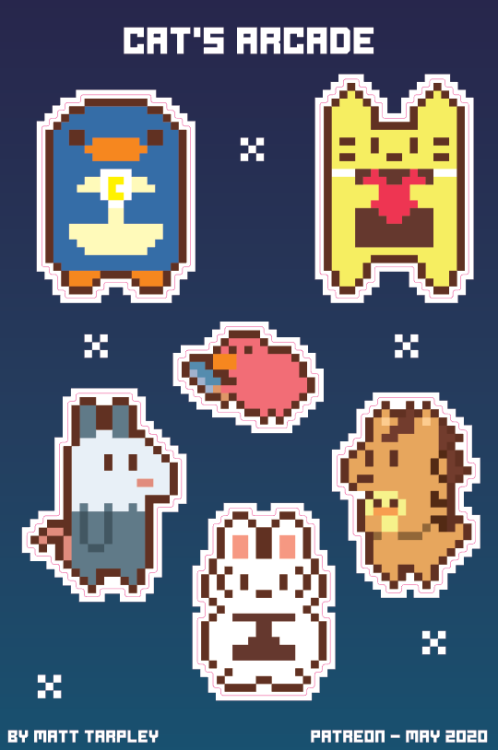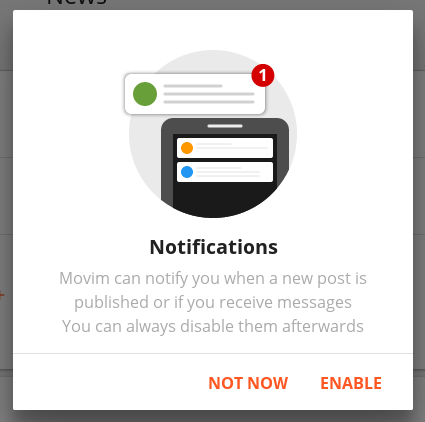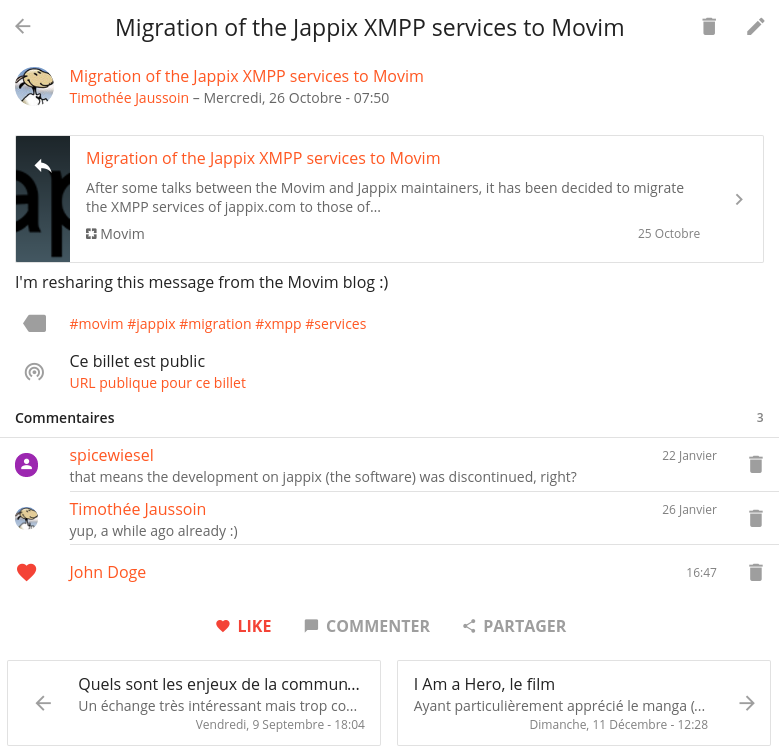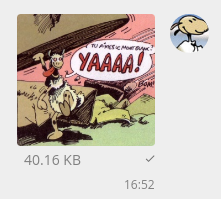-
 chevron_right
chevron_right
Newsletter: Jabber ID Discovery, New Referral Codes
Stephen Paul Weber · Monday, 1 May, 2023 - 05:00 edit · 4 minutes
Hi everyone!
Welcome to the latest edition of your pseudo-monthly JMP update!
In case it’s been a while since you checked out JMP, here’s a refresher: JMP lets you send and receive text and picture messages (and calls) through a real phone number right from your computer, tablet, phone, or anything else that has a Jabber client. Among other things, JMP has these features: Your phone number on every device; Multiple phone numbers, one app; Free as in Freedom; Share one number with multiple people.
It has been a while since we got a newsletter out, and lots has been happening as we race towards our launch.
For those who have experienced the issue with Google Voice participants not showing up properly in our MMS group texting stack, we have a new stack in testing right now. Let support know if you want to try it out, it has been working well so far for those already using it.
If you check your account settings for the “refer a friend” option you will now see two kinds of referral code. The list of one-time use codes remains the same as always: a free month for your friend, and a free month’s worth of credit for you if they start paying. The new code up in the top is multi-use and you can post and share it as much as you like. It provides credit equivalent to an additional month to anyone who uses it on sign up after their initial $15 deposit as normal, and then a free month’s worth of credit for you after that payment fully clears.
We mentioned before that much of the team will be present at FOSSY, and we can now reveal why: there will be a conference track dedicated to XMPP, which we are helping to facilitate! Call for proposals ends May 14th. Sign up and come out this summer!
For quite some time now, customers have been asked while registering if they would like to enable others who know their phone number to discover their Jabber ID, to enable upgrading to end-to-end encryption, video calls, etc. The first version of this feature is now live, and users of at least Cheogram Android and Movim can check the contact details of anyone they exchange SMS with to see if a Jabber ID is listed. We are happy to announce that we have also partnered with Quicksy to allow discovery of anyone registered for their app or directory as well.
 Jabber-side reactions are now translated where possible into the tapback pseudo-syntax recognized by many Android and iMessage users so that your reactions will appear in a native way to those users. In Cheogram Android you can swipe to reply to a message and enter a single emoji as the reply to send a reaction/tapback.
Jabber-side reactions are now translated where possible into the tapback pseudo-syntax recognized by many Android and iMessage users so that your reactions will appear in a native way to those users. In Cheogram Android you can swipe to reply to a message and enter a single emoji as the reply to send a reaction/tapback.
There have been two Cheogram Android releases since our last newsletter, with a third coming out today. You no longer need to add a contact to send a message or initiate a call. The app has seen the addition of moderation features for channel administrators, as well as respecting these moderation actions on display. For offensive media arriving from other sources, in avatars, or just not moderated quickly enough, users also have the ability to permanently block any media they see from their device.
Cheogram Android has seen some new sticker-related features including default sticker packs and the ability to import any sticker pack made for signal (browse signalstickers.com to find more sticker packs, just tap “add to signal” to add them to Cheogram Android).
There are also brand-new features today in 2.12.1-5, including a new onboarding flow that allows new users to register and pay for JMP before getting a Jabber ID, and then set up their very own Snikket instance all from within the app. This flow also features some new introductory material about the Jabber network which we will continue to refine over time:
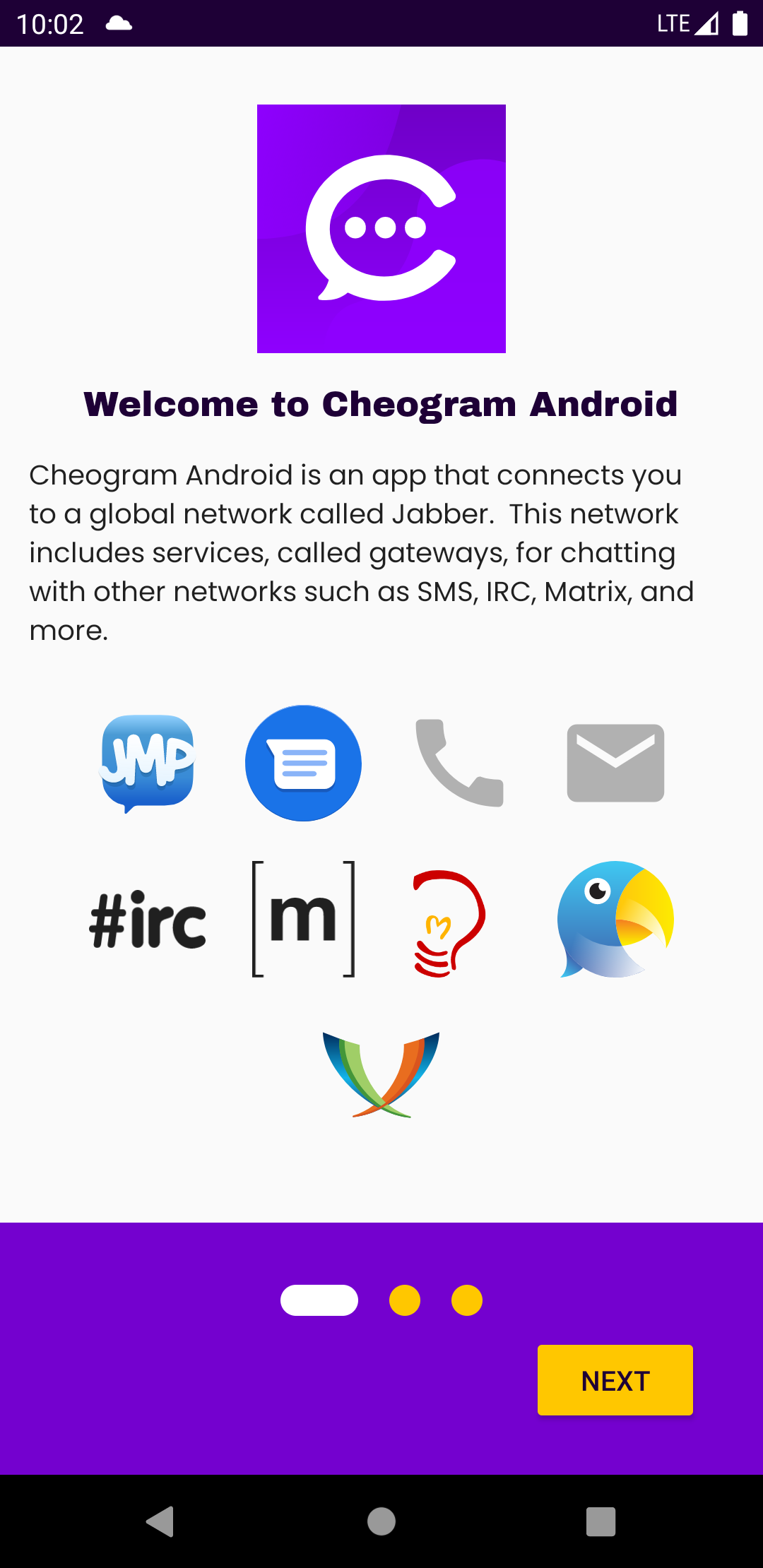
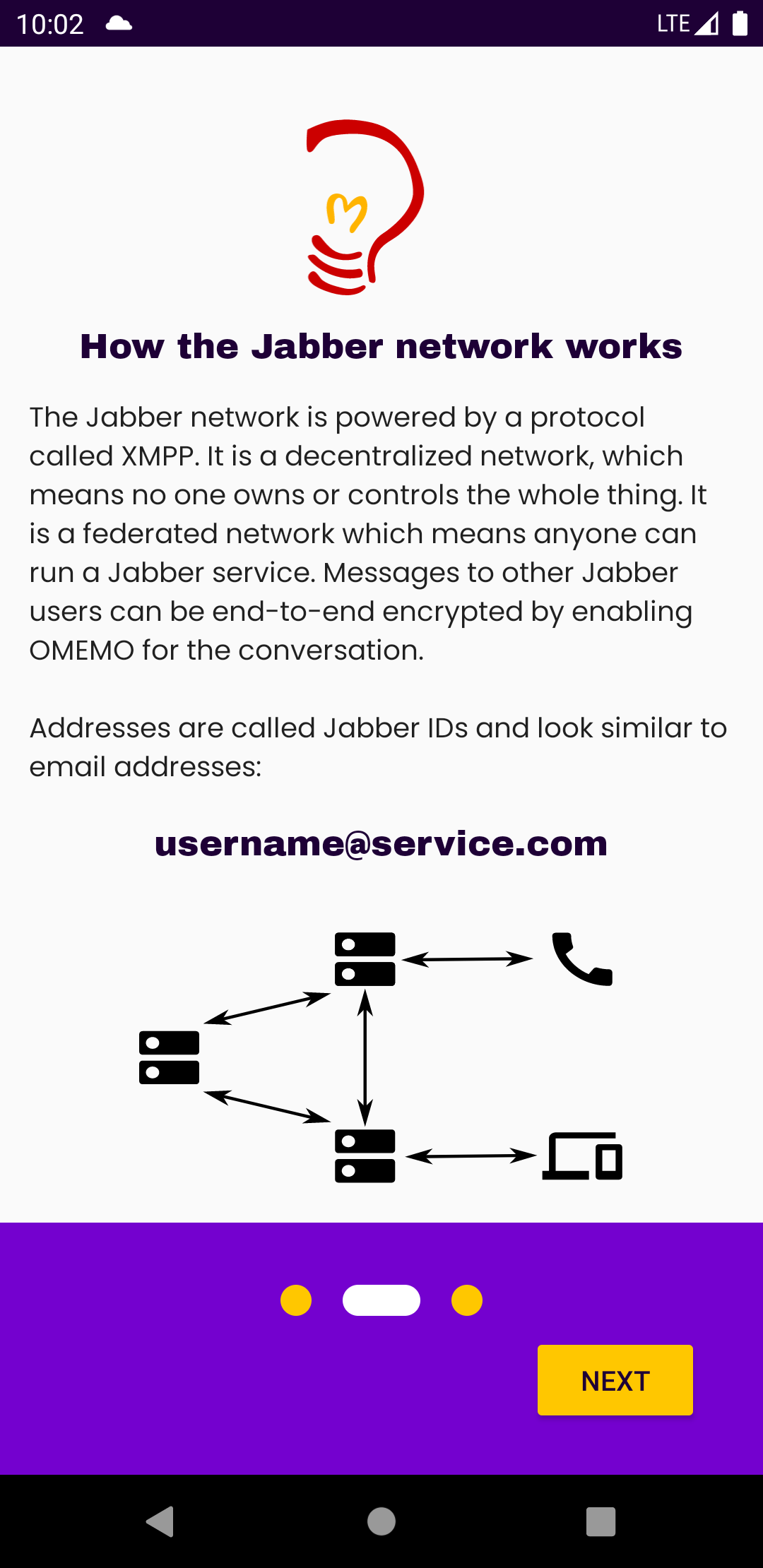
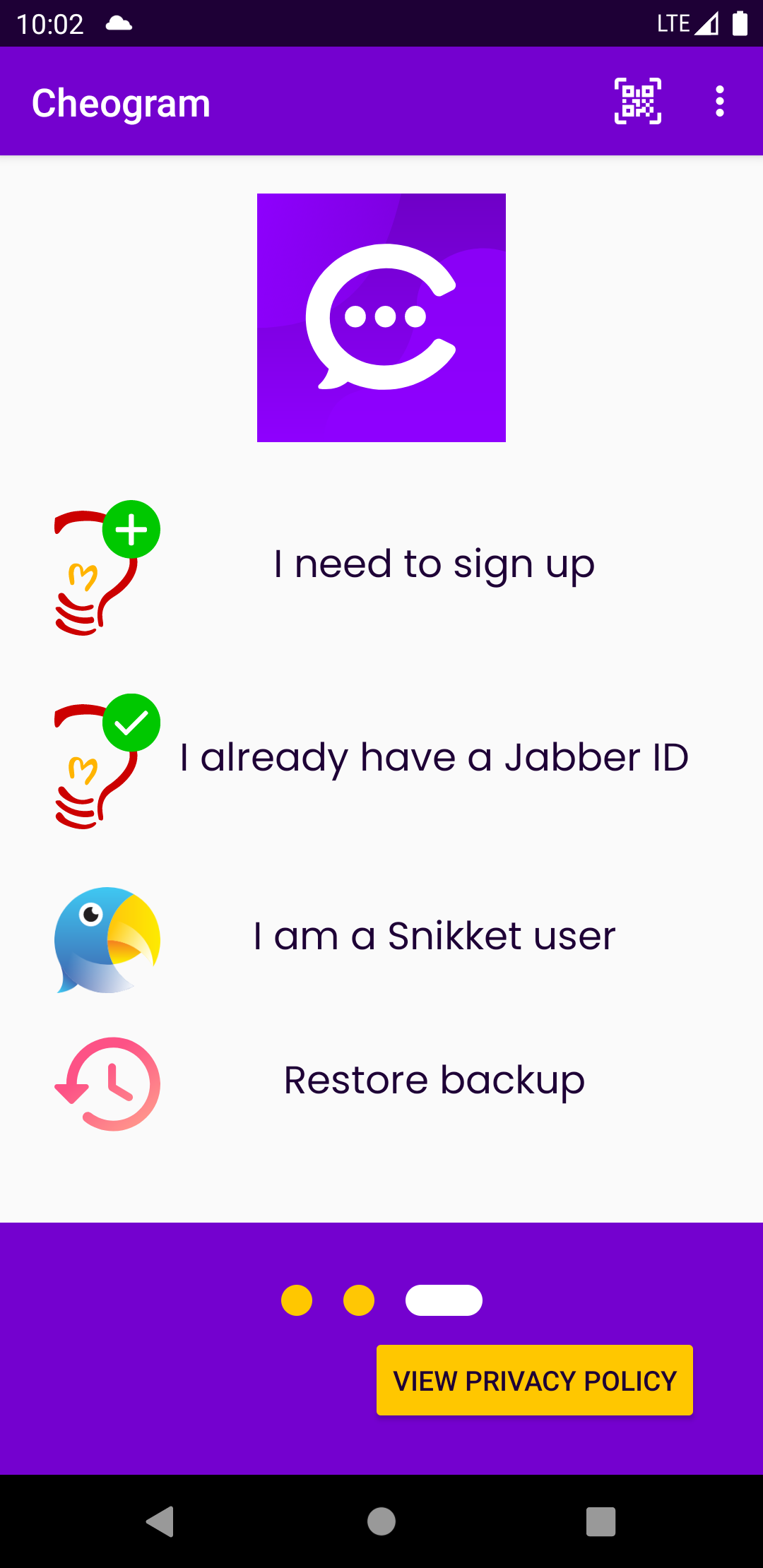
Notifications about new messages now use the conversation style in Android. This means that you can set seperate priority and sounds per-conversation at the OS level on new enough version of Android. There is also an option in each conversation’s menu to add that conversation to your homescreen, something that has always been possible with the app but hopefully this makes it more discoverable for some.
For communities organizing in Jabber channels, sometimes it can be useful to notify everyone present about a message. Cheogram Android now respects the attention element from members and higher in any channel or group chat. To send a message with this priority attached, start the message body with @here (this will not be included in the actual message people see).
This release also brings an experimental prototype supporting WebXDC. This is an experimental specification to allow developers to ship mini-apps that work inside your chats. Take any *.xdc file and send it to a contact or group chat where everyone uses Cheogram Android and you can play games, share notes, shopping lists, calendars, and more. Please come by the channel to discuss the future of this technology on the Jabber network with us.
To learn what’s happening with JMP between newsletters, here are some ways you can find out:
- The chatroom remains the heart of the community. You can also join from your web browser or from Matrix.
- The blog, where you may be reading this. Can also be followed in a client like Movim.
- The Lemmy Community
- The Subreddit
- On Twitter
Thanks for reading and have a wonderful rest of your week!



